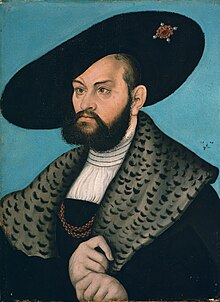Was mein Gott will, das g'scheh allzeit, BWV 111
| Was mein Gott will, das g'scheh allzeit | |
|---|---|
| BWV 111 | |
| Chorale cantata by J. S. Bach | |

Albert, Duke of Prussia, author of the hymn
|
|
| Occasion | Third Sunday after Epiphany |
| Performed | 21 January 1725: Leipzig |
| Movements | 6 |
| Cantata text | anonymous |
| Chorale | "Was mein Gott will, das g'scheh allzeit" by Albert, Duke of Prussia |
| Vocal | SATB choir and solo |
| Instrumental |
|
Was mein Gott will, das g'scheh allzeit (What my God wants, may it always happen),BWV 111, is a cantata by Johann Sebastian Bach for use in a Lutheran service. He composed the chorale cantata in Leipzig in 1725 for the third Sunday after Epiphany and first performed it on 21 January 1725, as part of his chorale cantata cycle. It is based on the hymn by Albert, Duke of Prussia, published in 1554, on the topic of the Christian's acceptance of God's will.
When Bach composed the cantata, he was in his second year as Thomaskantor (director of church music) in Leipzig. During his first year, beginning with the first Sunday after Trinity 1723, he had written a cycle of cantatas for the occasions of the liturgical year. In his second year he composed a second annual cycle of cantatas, which was planned to consist exclusively of chorale cantatas, each based on one Lutheran hymn. It included Was mein Gott will, das g'scheh allzeit.
Bach wrote the cantata for the third Sunday after Epiphany. The prescribed readings for the Sunday were taken from the Epistle to the Romans, rules for life (), and from the Gospel of Matthew, the healing of a leper (). The cantata text is based on a chorale in four stanzas, which is still popular. Three stanzas were written by Albert, Duke of Prussia, who introduced the Reformation into Prussia. An anonymous hymnwriter added the final stanza already in the first publication in 1554. In the typical format of Bach's chorale cantatas, the first and last stanza are retained unchanged, while an unknown librettist paraphrased the inner stanzas to texts for recitatives and arias. In this case, he transcribed rather freely each stanza of the hymn to a sequence of aria and recitative. Similar to Bach's cantata for the same occasion in the first cycle, Herr, wie du willt, so schicks mit mir, BWV 73, the text deals with the Christian's acceptance of God's will.
...
Wikipedia
